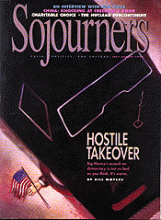Some days ago I received an unexpected call from Lima, Peru. A brother Franciscan there told me that Olga Valencia had died and, knowing of my friendship with her, he had attended the funeral. The news brought a flood of memories.
It's hard to pinpoint my first encounter with Olga. Surely it had to do with some request of hers for help—work, food, a handout. For she was the quintessential Third World mother, continually asking, begging, cajoling those of us in positions of privilege for charity on her own behalf and that of her numerous offspring. I must confess that in those early years she struck me as a whining, bothersome, pestering person, whom I tended to dispatch as quickly as possible.
One day her oldest child, 9-year-old Jose, was killed by a hit-and-run driver. It took Olga four days to bury him, and I walked alongside her during those terrible hours. From a halting investigation of the accident, to a still more halting autopsy in the city morgue, to a funeral director who wanted his money up front, to dealing with the accused driver—everything stood in the way of Olga's burying little Jose with dignity.
In the end, out of desperate necessity (no embalming in Peru) this mother, her husband, and I took Jose's body to the paupers' graveyard and buried him there. Then I drove them home, sat with them for a while, and left them to pick up once again the threads of their miserable existence. That day forever changed my relationship with Olga, and in some ways forever changed me.
Read the Full Article
